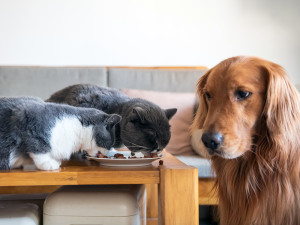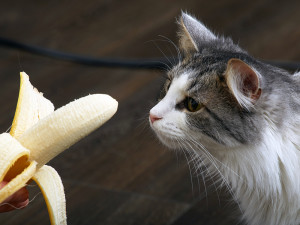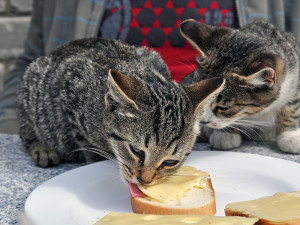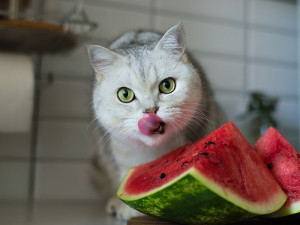Can Cats Eat Garlic?
It’s a human cooking staple, but your cat shouldn’t indulge.

Share Article
Garlic bread, garlic aioli, creamy garlic pasta sauce, garlic wings, garlic broth — as far as flavors go, garlic is one of the most iconic there is. If vegetables were One Direction, garlic is Harry. It’s one of those foods that sticks out from the crowd. So it makes sense that we’d be tempted to share with our cats; don’t they deserve the best? Well, yes, obviously. But what’s best for you isn’t necessarily best for your pet. When it comes to garlic, cats lean more on the vampire side than the human one. So before dishing out a few cloves, read everything you need to know about feeding garlic to cats below.
Nutrition facts: Garlic for cats
Is garlic good for cats?
The quick answer: No — cats should never have garlic. According to veterinary nutritionist Dr. Marge Chandler, “Garlic is toxic for cats…and can result in a fatal anaemia.”
Garlic is from the Allium family, which is the same family as onions — another food cats and dogs should avoid. Cats are even more susceptible to poisoning from garlic and onions than dogs; it only takes a few bites for snack-time to become dangerous. Every cat is different, but if you ask us, it’s definitely not worth the risk.
Can cats eat garlic?
No. Garlic is considered toxic to cats. The most typical reactions are vomiting, diarrhea, nausea, abdominal pain, and drooling. In more severe cases and high levels of garlic intake, garlic can damage red blood cells and cause them to rupture. This leads to an increased heart rate, increased respiratory rate, pale gums, weakness, collapse, and, in rare cases, death.

Symptoms can set in two to four days after garlic is consumed — so even if your cat seems to take well to garlic, get a vet’s input as soon as possible. Vets can sometimes help immediately by inducing vomiting (never induce vomiting at home — leave it to the pros) or administering activated charcoal. If the poisoning has already begun to take course, your cat may need IV fluids, a blood transfusion, and/or oxygen therapy.
Is garlic completely safe for cats?
No, garlic is toxic for cats. The amount of garlic it would take to poison your cat varies greatly depending on your cat’s weight, health, and breed. Often, a single clove of garlic can be toxic for a cat. That’s why it’s not worth risking giving your kitty even a little taste, no matter how grumpily they watch you eat your pasta.
Dried, liquid, raw, powdered, and cooked garlic are all toxic to cats; that means no sharing treats or meals cooked in garlic, either. As little as 1/8 teaspoon of garlic powder can be poisonous. If you take a supplement with garlic as an ingredient, even that can harm your kitty, so keep your cat away from the bottle or any dropped pills.
There’s a common conception that garlic can act as a natural flea preventative for cats. Unfortunately, it’s just not true. “Garlic is toxic for cats and does not provide any benefit for fleas,” Dr. Chandler says . “The concept is that a product from the garlic would come out in sweat; however, cats only have sweat glands on their paws, so [garlic is] not very useful even if it wasn’t toxic.”
Luckily, there are lots of non-toxic flea preventatives on the market. The good news is these options won’t stink up your kitty, but the bad news is you can’t throw the extra in your spaghetti — you win some, you lose some.
Other foods that are good for cats
Yogurt: A small amount of yogurt can be a protein-packed treatopens in new tab for your cat.
Tuna: Fish—including tuna—can have some great health benefitsopens in new tab for cats.
Sweet potatoes: Plain sweet potatoes are an excellent source of nutritionopens in new tab for your cat.
Other foods that are not good for cats
Grapes: Like garlic, grapes are toxic for catsopens in new tab.
Butter: With its high-fat contentopens in new tab and lactose, butter isn’t healthy for cats.
Chocolate: Chocolate is one of the most common household toxinsopens in new tab for cats, and should be avoided.
The bottom line: Human food for cats
Cats should never eat garlic. It is highly toxic for cats, and should be avoided. Instead, focus on giving your cat a complete and balanced cat food diet.
FAQs (People also ask)
Is it OK to give cats garlic?
No, it is not OK to give cats garlic. Garlic is highly toxic for cats, and can poison them.
Can cats eat garlic?
No, cats cannot eat garlic.
Is garlic safe for cats?
Garlic is highly toxic for cats and should never be given to them. Ingestion of garlic can result in vomiting, diarrhea, nausea, abdominal pain, and drooling, and more.
How much garlic can a cat eat?
None. Even just a single clove of garlic can be toxic for a cat.
References

Sio Hornbuckle
Sio Hornbuckle is the Assistant Editor at Kinship, where they frequently write for the site. As a writer, they specialize in pet news, animal science, and pop culture. They live in New York City with their cat, Toni Collette.
Related articles
![Two grey cats eating dog food from a plate while a brown dog looks on with jealousy]()
Can Cats Eat Dog Food?
It shouldn’t be their main course. Here’s why.
![Cat eating from a plate of raspberries and blueberries]()
Can Cats Eat Blueberries?
Go ahead and serve up the superfood — with a couple caveats.
![A cat staring at a peeled banana]()
Can Cats Eat Bananas?
Gwen Stefani taught us how to spell it, but can we feed this fruit to our cats?
![Two grey cats eating swiss cheese off of slices of bread while sitting on a table]()
You Should Not Invite Your Cat to Your Fancy Cheese Party
Save the charcuterie for the humans.
![White kitten with tongue out next to slices of watermelon]()
Can Cats Eat Watermelon and Watermelon Rind?
Yes, watermelon is a nutritious treat for cats.
![A kitten sniffing a ripe half of an avocado in a bowl]()
Can Cats Eat Avocados?
Just don’t get out the guacamole bowl.






